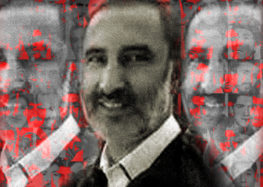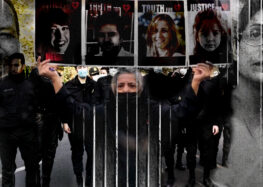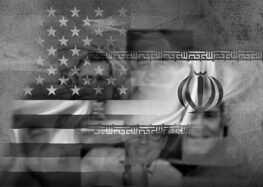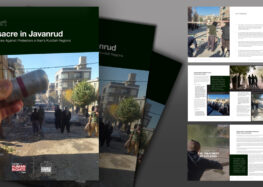Nasrin Sotoudeh: “If We’re Going to Die, Let Us Be by Our Families’ Sides”
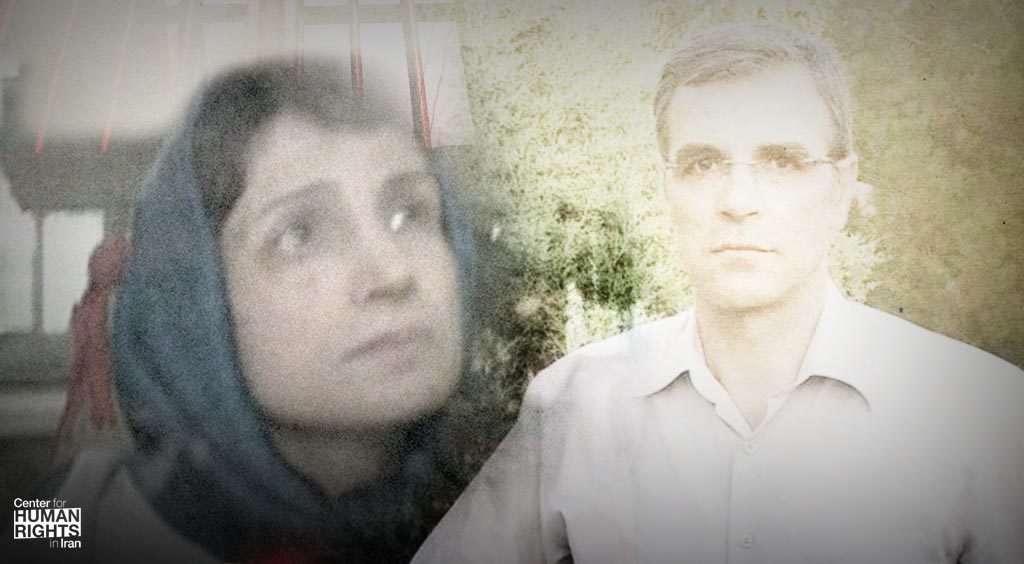 Jailed Attorney, Fellow Political Prisoners Hunger Strike for Freedom Amid COVID-19 Outbreak
Jailed Attorney, Fellow Political Prisoners Hunger Strike for Freedom Amid COVID-19 Outbreak
March 17, 2020 — At least three political activists in Tehran’s Evin Prison have joined prominent imprisoned human rights attorney Nasrin Sotoudeh’s hunger strike demanding “freedom for all political prisoners” amid the country’s deadly COVID-19 outbreak, the Center for Human Rights in Iran (CHRI) has learned.
Sotoudeh’s husband, Reza Khandan, who lives in Tehran with their two children, told CHRI that his wife is aware of the dangers of going on hunger strike amid a deadly viral outbreak when Iranian prisons are lacking crucial medicines and sanitary supplies and that she had started the hunger strike only as a “last resort.”
“Nasrin says, ‘If we’re going to die, let us be by our families’ sides, can’t you let us go even under these circumstances?’” he said, quoting his wife.
Khandan added that other prisoners of conscience including Rezvaneh Khanbeigi, Hossein Sarlak and Morteza Nazari are also refusing food in solidarity with Sotoudeh.
The renowned defense attorney’s protest was launched after Iranian judicial officials stated that they had released 85,000 prisoners on furlough (temporary leave) to prevent the spread of the novel coronavirus COVID-19, which had killed at least 988 people and infected 16,169 as of March 17, 2020, according to the country’s Health Ministry.
Iranian officials have not provided official lists of who has been released. Nor have they indicated why some—including peaceful dual and foreign nationals as well as political prisoners—remain behind bars while others around them are granted furlough.
On March 17, Iranian-British dual national prisoner Nazanin Zaghari-Ratcliffe was granted temporary release from the Women’s Ward of Evin Prison until April 4, 2020, according to the Free Nazanin campaign.
It remains unclear why other dual nationals including fellow British-Iranian citizen Anoosheh Ashoori or U.S.-Iranian citizen Siamak Namazi have meanwhile been denied furlough.
Khandan, a former political prisoner himself, echoed rights advocates’ concerns that Iran’s jails could be breeding grounds for deadly COVID-19 outbreaks due to documented overpopulation and unsanitary living conditions.
Following is an excerpted transcript of his comments to CHRI:
We are going through truly extraordinary times. It’s like we have reached the end of the world. Our country is in a very unusual situation… The virus has spread throughout the country and the people’s lives are in danger. Under these circumstances, imagine you have a relative in prison and you don’t know if she’s alive or dead because prisoners can only use the phone for five minutes a day.
Even under normal circumstances, non-political prisoners are easily granted furlough, more than what the law allows. We are not opposed to that. They should be released. But our emphasis is on the political prisoners because they are innocent. They have been imprisoned simply for making a criticism. Some of them, like the conservationists, did not even criticize…
A few months ago, Nasrin begged [fellow prisoner of conscience] Farhad Meysami not to go on a hunger strike because it was too dangerous. In a way she was saying she herself would not go that far. But these are extraordinary circumstances.
Political prisoners are worried about themselves and even more so for their families. They believe that if they were out of prison, they could protect their families and children. But they are still incarcerated, spending every moment waiting to hear tragic news from the outside.
The prisons are not in good condition. The best way to fight this disease is to have separation and put people in quarantine. But gatherings cause this disease to spread; a prison is nothing but a gathering place and our prisons are overcrowded. I myself was imprisoned in a room with 60 other inmates. It’s not like you can separate yourself and put yourself under quarantine. When a disease gets inside the prison, it won’t leave so easily.
The authorities have brought the situation to a point that forced Nasrin, who was against hunger-striking, to prepare a statement along with [cellmate] Nahid Behshid about going on hunger strike. And as soon as they did it, the authorities told Ms. Behshid she could post bail and be released on furlough. Of course, Ms. Behshid will continue her hunger strike until she is released.
The following statement was posted in Persian on Nasrin Sotoudeh’s official Facebook page on March 16, 2020, and has been translated into English by CHRI:
In the midst of a crisis plaguing the world and Iran, the military and intelligence establishments that have undermined the country’s security with their militant actions are insisting on continuing the incarceration of political prisoners during the current alarming situation in order to further deepen and widen this calamity and allow this deadly viral storm to annihilate all political prisoners or their families. All the indications are that the sole decision-makers in this regard are none other than the police and security agencies — the same agencies that have thrown the country into a state of collapse and confusion.
It is a national necessity to close many wards in the country’s prisons, namely the Women’s Ward in Evin Prison. It is also a national necessity for the government to seek peace with the world in order to benefit from science and technology to combat the coronavirus disease. Given that all legal and judicial communications have remained unanswered, as the last resort of a prisoner, I will start a hunger strike to reiterate the demand for the release of political prisoners. Nasrin Sotoudeh, Evin Prison – March 16.
In a press conference on March 17, Judiciary Spokesman Gholam-Hossein Esmaili stated that to date “half” of all prisoners convicted of alleged “security” charges—which have been used to jail peaceful activists including Sotoudeh—had been released on furlough, along with 85,000 non-political convicts.
Esmaili did not reveal how many political prisoners remained behind bars.
In his latest report presented to the Human Rights Council, Javaid Rehman, the UN Special Rapporteur on the situation of human rights in the Islamic Republic of Iran, said he was seriously concerned about “overcrowding, poor nutrition and a lack of hygiene” in Iran’s prisons and at a recent press briefing called for all political prisoners to be released to protect them from COVID-19.
Read this article in Persian.



